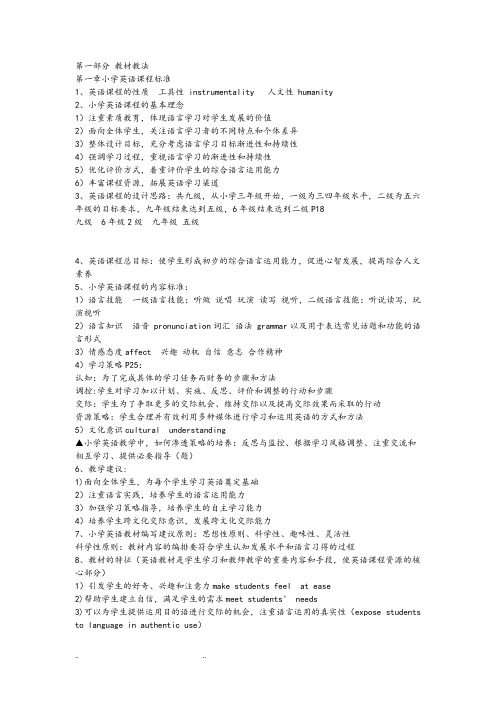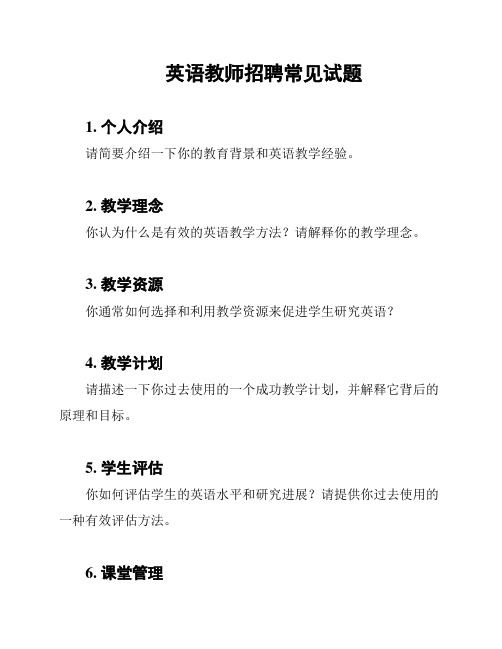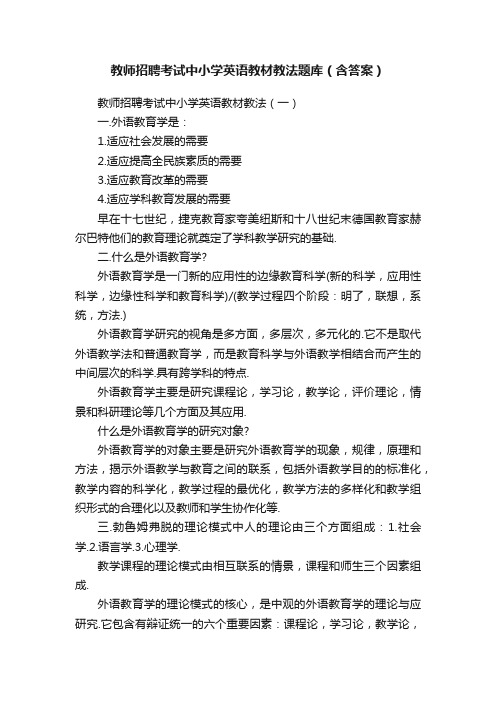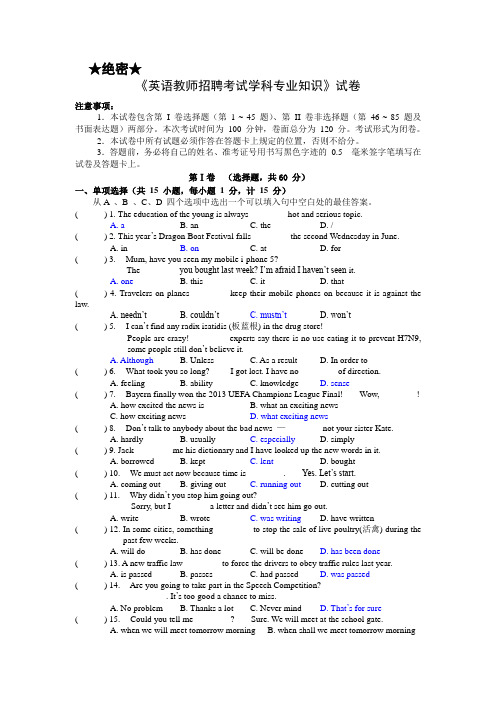英语教师招聘考试-学科专业知识(含参考答案)
(完整版)小学英语教师招聘考试(英语学科知识)(最新整理)

第一部分教材教法第一章小学英语课程标准1、英语课程的性质工具性 instrumentality 人文性 humanity2、小学英语课程的基本理念1)注重素质教育,体现语言学习对学生发展的价值2)面向全体学生,关注语言学习者的不同特点和个体差异3)整体设计目标,充分考虑语言学习目标渐进性和持续性4)强调学习过程,重视语言学习的渐进性和持续性5)优化评价方式,着重评价学生的综合语言运用能力6)丰富课程资源,拓展英语学习渠道3、英语课程的设计思路:共九级,从小学三年级开始,一级为三四年级水平,二级为五六年级的目标要求,九年级结束达到五级,6年级结束达到二级P18九级 6年级2级九年级五级4、英语课程总目标:使学生形成初步的综合语言运用能力,促进心智发展,提高综合人文素养5、小学英语课程的内容标准:1)语言技能一级语言技能:听做说唱玩演读写视听,二级语言技能:听说读写,玩演视听2)语言知识语音 pronunciation词汇语法 grammar以及用于表达常见话题和功能的语言形式3)情感态度affect 兴趣动机自信意志合作精神4)学习策略P25:认知:为了完成具体的学习任务而财务的步骤和方法调控:学生对学习加以计划、实施、反思、评价和调整的行动和步骤交际:学生为了争取更多的交际机会、维持交际以及提高交际效果而采取的行动资源策略:学生合理并有效利用多种媒体进行学习和运用英语的方式和方法5)文化意识cultural understanding▲小学英语教学中,如何渗透策略的培养:反思与监控、根据学习风格调整、注重交流和相互学习、提供必要指导(题)6、教学建议:1)面向全体学生,为每个学生学习英语奠定基础2)注重语言实践,培养学生的语言运用能力3)加强学习策略指导,培养学生的自主学习能力4)培养学生跨文化交际意识,发展跨文化交际能力7、小学英语教材编写建议原则:思想性原则、科学性、趣味性、灵活性科学性原则:教材内容的编排要符合学生认知发展水平和语言习得的过程8、教材的特征(英语教材是学生学习和教师教学的重要内容和手段,使英语课程资源的核心部分)1)引发学生的好奇、兴趣和注意力make students feel at ease2)帮助学生建立自信,满足学生的需求meet students’ needs3)可以为学生提供运用目的语进行交际的机会,注重语言运用的真实性(expose students to language in authentic use)4)能够考虑到语言教学的积极影响往往会延迟以及学生之间学习风格learning style和情感态affective factors的差异。
教师招聘高中英语“英文常见陷阱句四”(语法知识) - 英语学科专业基础知识

教师招聘高中英语“英文常见陷阱句四”(语法知识)- 英语学科专业基础知识中小学教师职业道德规范教师招聘考试试题及答案【英文常见陷阱句】同位语从句1.定义:用作同位语的从句叫做同位语从句。
2.用法:同位语从句的先行词多为fact,news,idea,thought,question,reply,report,remark等,关联词多用从属连词that。
如:Theywereallverymuchworriedoverthefactthatyouweresick.对你生病这件事,他们都很焦虑。
WheredidyougettheideathatIcouldnotcome?你在哪儿听说我不能来?EarlyinthedaycamethenewsthatGermanyhaddeclaredwaronRussi a.德国已对俄国宣战的消息一大早就传来了。
注:同位语从句偶尔由从属连词whether引导。
如:Ihavenoideawhetherhe’llcomeornot.我不知道他是否来。
连接代词who,which,what和连接副词where,when,why,how亦可引导同位语从句。
Thequestionwhoshoulddotheworkrequiresconsideration.谁该干这项工作,这个问题需要考虑。
Wehaven’tyetsettledthequestionwherewearegoingtospendoursum mervacation.到哪儿去度暑假,这个问题我们还没有决定。
Itisaquestionhowhedidit.那是一个他如何做了此事的问题。
解释:1.that引导的同位语从句与定语从句之区别that引导的同位语从句that引导的定语从句句法功能上that只起连接从句的作用,无意义。
在从句中不充当句子成分。
不可省。
that替代先行词在从句中不仅起连接作用,还充当一个句子成分。
如在从句中作动词的宾语时可省略。
英语教师招聘常见试题

英语教师招聘常见试题
1. 个人介绍
请简要介绍一下你的教育背景和英语教学经验。
2. 教学理念
你认为什么是有效的英语教学方法?请解释你的教学理念。
3. 教学资源
你通常如何选择和利用教学资源来促进学生研究英语?
4. 教学计划
请描述一下你过去使用的一个成功教学计划,并解释它背后的原理和目标。
5. 学生评估
你如何评估学生的英语水平和研究进展?请提供你过去使用的一种有效评估方法。
6. 课堂管理
你如何管理一个学生多样化的英语课堂?请谈谈你的方法和策略。
7. 技术应用
你是否在课堂上使用过技术工具来辅助教学?请分享你所使用的一种技术工具及其作用。
8. 班级合作
你如何鼓励学生之间的合作和团队精神?请提供你过去使用的一种激励方法。
9. 面对困难
如果你在教学过程中遇到学生研究困难或行为问题,你会如何处理?请描述你的解决方案和策略。
10. 继续专业发展
作为一名英语教师,你如何持续提升自己的专业知识和教学技能?请分享你过去参与的一个专业发展活动。
以上是英语教师招聘中常见的试题,希望你能基于自己的经验和理念进行回答。
祝你成功!。
小学英语教师招聘考试英语学科知识

小学英语教师招聘考试英语学科知识标题:小学英语教师招聘考试英语学科知识一、引言在小学教育中,英语学科知识的掌握对于英语教师来说至关重要。
在招聘小学英语教师时,考察其英语学科知识也是必要环节。
本文将探讨如何在招聘考试中考察小学英语教师的英语学科知识。
二、语言知识作为小学英语教师,掌握基本的语言知识是必要的。
在招聘考试中,可以考察以下几个方面:1、语音知识:教师应能够正确发音单词和句子,掌握音节划分和重音规则。
2、语法知识:教师应熟悉句子的结构、时态、语态和主谓一致等基本语法规则。
3、词汇知识:教师需要掌握一定数量的常用词汇,能够理解并运用这些词汇进行日常教学。
三、语言技能除了语言知识,英语教师还需要具备良好的语言技能,包括听、说、读、写和译。
在招聘考试中,可以考察以下方面:1、听力技能:教师需要能够听懂基本的英语会话,能够理解并回答相关问题。
2、口语技能:教师需要能够清晰、流利地说英语,能够进行基本的课堂交流。
3、阅读技能:教师需要能够阅读和理解不同难度的英语文章,能够将其主要内容传达给学生。
4、写作技能:教师需要能够用英语书写简单、通顺的句子和段落,能够写教案和教学反思。
5、翻译技能:教师需要能够进行基本的英汉互译,能够将复杂句子准确翻译成中文。
四、教学知识在招聘考试中,还需要考察教师的教学知识,包括以下几个方面:1、教学设计:教师需要能够根据课程目标和教材内容设计有趣、实用的教学活动。
2、教学方法:教师需要了解不同的教学方法和策略,能够根据学生的年龄和特点选择合适的方法。
3、教学评估:教师需要能够评估学生的学习成果,能够制定科学的评估标准和方法。
五、结语招聘小学英语教师时,需要全面考察其英语学科知识、语言技能和教学知识。
只有具备这些能力的教师才能够在小学英语教育中发挥出色,提高教学质量,帮助学生更好地掌握英语语言。
小学英语教师招聘考试小学英语教师招聘考试在当今全球化的时代,英语已成为一门国际通用语言,是孩子们未来成功的重要技能之一。
教师招聘考试中小学英语教材教法题库(含答案)

教师招聘考试中小学英语教材教法题库(含答案)教师招聘考试中小学英语教材教法(一)一.外语教育学是:1.适应社会发展的需要2.适应提高全民族素质的需要3.适应教育改革的需要4.适应学科教育发展的需要早在十七世纪,捷克教育家夸美纽斯和十八世纪末德国教育家赫尔巴特他们的教育理论就奠定了学科教学研究的基础.二.什么是外语教育学?外语教育学是一门新的应用性的边缘教育科学(新的科学,应用性科学,边缘性科学和教育科学)/(教学过程四个阶段:明了,联想,系统,方法.)外语教育学研究的视角是多方面,多层次,多元化的.它不是取代外语教学法和普通教育学,而是教育科学与外语教学相结合而产生的中间层次的科学.具有跨学科的特点.外语教育学主要是研究课程论,学习论,教学论,评价理论,情景和科研理论等几个方面及其应用.什么是外语教育学的研究对象?外语教育学的对象主要是研究外语教育学的现象,规律,原理和方法,揭示外语教学与教育之间的联系,包括外语教学目的的标准化,教学内容的科学化,教学过程的最优化,教学方法的多样化和教学组织形式的合理化以及教师和学生协作化等.三.勃鲁姆弗脱的理论模式中人的理论由三个方面组成:1.社会学.2.语言学.3.心理学.教学课程的理论模式由相互联系的情景,课程和师生三个因素组成.外语教育学的理论模式的核心,是中观的外语教育学的理论与应研究.它包含有辩证统一的六个重要因素:课程论,学习论,教学论,评价理论,科研理论和环境.另一角度看包含课程设计者,学生,教师,评估人员四个因素.四.语言教育(第二语言教育)有三个主要源泉:1.语言描写.2.语言学习论.3.语用论.外语教育学可分三个层次:1.宏观的相关学科作为基础2.中观的外语教育学理论与应用作为体系3.微观的外语教学法和外语教学实践作为源泉外语直接法在课程标准中取得主导地位的原因有三:1.受英美的语言家和外语直接法理论影响2.在我国出现一批直接教学法的外语教学法专家,介绍推广直接法,编写了许多直接教学法的专著和教材3.参加制定课程标准的一些专家本身就是直接法的倡导者五、1.现代外语教学是一个多元化,多维度,多层次的体系2.现代外语教学法指的是研究外语教学的指导思想,性质原理,目的原则,大纲教材,师生,评价和过程的方法.(师生关系,教学方法,方式,评价手段)3.根据哲学原理,现代外语教学法流派可分为:(1)理性主义.(2)经验主义.(3)经验理性主义. 根据教育学原理,可分为:(1)演绎法.(2)归纳法.(3)演绎归纳法.根据心理学原理,可分为:(1)认知规则的理论说.(2)刺激-反应形成习惯说.(3)认知-习惯说(或习惯-认知说)根据语言学原理,可人为:(1)语言是规则的体系.(2)语言是习惯的体系.(3)语言是习惯-规则的体系.培养他们的外语教育能力,就是指导自己的外语教育实践,提高外语教育质量.综合哲学,教育学,心理学语言说的三种类别,现代外语教学法流派可分为三大类:1.理性-规则体系2.经验-习惯体系3.习惯-认知体系外语教育学的缺陷:1.结构模式单一.(单纯操作性的模式:教师-教材-教法,重经验,轻理论.重教,轻学.重方法技巧,轻创造能力)2.理论薄弱.3.研究领域狭窄.2015教师招聘考试中小学英语教材教法(二)【现代外语教学法主要流派】(考核重点)外语教学法有:1.语法翻译法(翻译法,阅读法)2.直接法(改革法,自然法)3.自觉比较法(比较法,翻译比较法)4.听说法(口语法,句型法,军队教学法)5.视听法(情影性,最初叫:整体结构法)6.认知法(认知-符号法,现代的语法翻译法)7.自觉实践法8.功能法(功能-意念法,交际法)9.习得,监控理论的自然法.一.语法翻译法:是用母语翻译教授外语书面语的一种方法.目的在于培养学生通过翻译阅读原著和能过复杂的语法讲解和操练发展学生的智慧.逐词翻译是语法翻译法的教学基础,官能心理学是语法翻译法的心理学基础.教育学的演绎法成了语法翻译法的理解语法的基本方法.语法翻译法的基本特点:1.双重教学目的(培养学生通过翻译阅读原著的能力和磨炼学生智慧)2.翻译是教学的基本手段3.教学以语法为纲4.语法材料的安排是先语法后课文语法翻译法的优点:1.适度的翻译有利于外语教学2.重视通过大量阅读,背诵原著培养阅读能力3.注意利用语法,启发思维,训练智慧语法翻译法的缺点:1.过多利用翻译主要有两个弊病:一是占用大量教学时间,直接影响运用外语进行外语教学的实践机会,二是不利于培养学生不通过翻译为中介直接用外语理解和表达思想的能力.2.过分偏重阅读能力的培养,忽视听说能力的培养.3.重形式语法教学,轻技能训练和运用语言能力的培养.4.语法与课文脱节.二.直接法:通过用外语本身进行会话,交谈和阅读外语,而不用母语,翻译和形式语法,第一批词通过指示实物,图画或演示动作等办法来讲授.(直接法对翻译法进行针锋相对的抨击,提出相对立的主张.) 外语教学应使外语与客观事物直接联系以有声语言口语为基础.模仿为主的心理学为理论基础.类推原则成了直接法模仿操练的语言学的理论基础.帕格:直觉是获得知识的唯一源泉.温特:在语言行为的心理活动中起主导作用的不是思维,而是感觉.直接法的基本特点:1. 排除以母语为中介,外语与客观事物建立直接联系.2. 不学形式语法3. 先用耳听口说,后用眼看手写.外语教学主张有志语言是第一性的,书面语言是第二性的.4. 句子为教学的基本单位.5. 模仿操练形成习惯直接法的优点:1. 重视用外语教学外语和用实物,图画,手势,动作等直观手段进行外语教学.2. 重视语言实践操练和听说读写能力的培养.3. 重视语音,语调和口语的教学4. 重视模仿5. 句子是外语教学的基本单位直接法的缺点:1. 忽视母语的中介作用.母语可以用来讲解一些较抽象的语言知识.2. 忽视语法的监控和指导作用.3. 片面重视口语能力的培养.(忽视在口语基础上加强读写能力的培养)4. 语言材料安排缺乏科学的顺序.(有时一次出现难点太多,过于集中,学生不易掌握)三.自觉对比法: 是指学生通过分析,对比外语与母语的语法结构达到自觉理解语言材料理的一种方法. 它是继承和发展了语法翻译法特点.自觉原则成了自觉对比法的重要的教育学理论基础,生理学家巴甫洛夫的两种信号学说是自觉对比法的另一个心理学理论基础.系统的外语知识在外语教学中起主导作用.母语与外语相互翻译和对比是自觉理解和掌握外语的根本手段,是学生自觉学习外语的基础. 书面语是外语教学的基础,阅读是外语教学的主要的和最重要的手段,视觉感知外语是最可靠的感知,是外语教学的出发点.自觉对比法的特点:1. 依靠母语进行翻译和对比(唯一特殊性原则)2. 语言规则指导语言实践3. 在分析\理解语言知识基础上模仿4. 在书面语基础上进行口语教学5. 由分析到综合(语音一词汇一句子一课文)自觉对比法的优点:1. 重视外语教学的思想教育性2. 重视培养学生的阅读能力3. 重视自觉性原则4. 外语与母语翻译对比,有助于编写出教材,发挥母语的正迁移作用.5. 掌握语法规则有助于掌握外语自觉对比法的缺点:1. 学生难以掌握听,说,读,写能力以进行交际2. 过分重视思想教育,而忽视了外语教学的规律性.3. 过分地强调翻译,对比和讲解语法。
英语教师招聘考试-学科专业知识(含参考答案)

★绝密★《英语教师招聘考试学科专业知识》试卷注意事项:1.本试卷包含第I 卷选择题(第1 ~ 45 题)、第II 卷非选择题(第46 ~ 85 题及书面表达题)两部分。
本次考试时间为100 分钟,卷面总分为120 分。
考试形式为闭卷。
2.本试卷中所有试题必须作答在答题卡上规定的位置,否则不给分。
3.答题前,务必将自己的姓名、准考证号用书写黑色字迹的0.5 毫米签字笔填写在试卷及答题卡上。
第Ⅰ卷(选择题,共60 分)一、单项选择(共15 小题,每小题 1 分,计15 分)从A 、B 、C、D 四个选项中选出一个可以填入句中空白处的最佳答案。
( ) 1. The education of the young is always ________ hot and serious topic.A. aB. anC. theD. /( ) 2. This year’s Dragon Boat Festival falls ________ the second Wednesday in June.A. inB. onC. atD. for( ) 3. -- Mum, have you seen my mobile i-phone 5?-- The ________ you bought last week? I’m afraid I haven’t seen it.A. oneB. thisC. itD. that( ) 4. Travelers on planes ________ keep their mobile phones on because it is against the law.A. needn’tB. couldn’tC. mustn’tD. won’t( ) 5. -- I can’t find any radix isatidis (板蓝根) in the drug store!-- People are crazy! ________ experts say there is no use eating it to prevent H7N9,some people still don’t believe it.A. AlthoughB. UnlessC. As a resultD. In order to( ) 6. -- What took you so long? -- I got lost. I have no ________ of direction.A. feelingB. abilityC. knowledgeD. sense( ) 7. -- Bayern finally won the 2013 UEFA Champions League Final! -- Wow, ________!A. how excited the news isB. what an exciting newsC. how exciting newsD. what exciting news( ) 8. -- Don’t talk to anybody about the bad news —________ not your sister Kate.A. hardlyB. usuallyC. especiallyD. simply( ) 9. Jack ________ me his dictionary and I have looked up the new words in it.A. borrowedB. keptC. lentD. bought( ) 10. -- We must act now because time is ________. -- Yes. Let’s start.A. coming outB. giving outC. running outD. cutting out( ) 11. -- Why didn’t you stop him going out?-- Sorry, but I ________ a letter and didn’t see him go out.A. writeB. wroteC. was writingD. have written( ) 12. In some cities, something ________ to stop the sale of live poultry(活禽) during the past few weeks.A. will doB. has doneC. will be doneD. has been done( ) 13. A new traffic law ________ to force the drivers to obey traffic rules last year.A. is passedB. passesC. had passedD. was passed( ) 14. -- Are you going to take part in the Speech Competition?-- ________. It’s too good a chance to miss.A. No problemB. Thanks a lotC. Never mindD. That’s for sure( ) 15. -- Could you tell me ________? -- Sure. We will meet at the school gate.A. when we will meet tomorrow morningB. when shall we meet tomorrow morningC. where we will meet tomorrow morningD. where shall we meet tomorrow morning二、完形填空(共15 小题,每小题 1 分,计15 分)阅读下面短文,掌握其大意,然后从各题所给的四个选项中选出一个最佳答案。
英语教师招聘编制考试专业知识复习提纲
英语教师招聘编制考试专业知识复习提纲首先明确几点:1、先了解近几年真题,对考试内容和题型有基本的判断,做到目标明确。
2、了解会考什么之后,准备一切有用的复习资料,有重点也全面。
3、扎实背完自己的复习资料。
将自己准备的资料有计划有目标的安排好每天复习内容。
复习资料除了购买书籍外,自己在过程中积累的也可以记下,作为过程中的材料。
4、落实任务,持之以恒,心态很重要。
一、英语专业知识考试内容【英语题型】1、选择题(不超过10题,包含有语法,语境,英美文学常识等)2、完型(基础不扎实的会在很多选项上犹豫)3、阅读(以选择题题型为多)4、任务型阅读(江苏高考出现的任务型阅读题型)5、作文(分为大小作文,主要体现在字数上,有看图,续写,议论等,不过难度不要求像专八那样的)6、教案设计这边就是选作了,小学英语选作小学的,中学的选作中学的。
二、复习资料推荐(一)《五年高考三年模拟》1、(最好都做完,要注意归纳和整理每种题型的易错点和方法。
书面表达可以多看看题型,有选择的写几篇不同题材的,不需要每篇都写。
)2、注重从做阅读中找感觉,练手熟。
3、如果觉得答案所给范文太low,可以自行依照专四作文要求或者大六的作文要求找范文补充。
4,选择题做的如果有不确定的蒙对是也要及时翻看答案,因为答案中有详解。
(二)英语新课标(三)中学或者小学教材(四)优秀教案(五)作文三、复习指导1、关于英语基础知识的选择题所涵盖范围参照上述,借助《三年高考五年模拟》系统复习。
要求全面、扎实。
注意英美文学知识的选择题为辅,而语法,语境一定是重点,所以一定要明确复习重点是什么。
2、完型复习。
建议遵循先通读,再做,再检验的方法,然后做个十来篇不同类型的,找准自己的薄弱点在哪里,是语法,还是上下文不理解,或者语感差等,然后不要机械的做下去了,要对症下药。
先攻下自己的薄弱,然后酌情补充,然后再练习。
可以读一些课外英语读物开拓眼界,读物可参考高中生提优拔高类,自主招生选拔的推荐英语书目。
天津市教师招聘考试 英语学科真题
天津市南开区教师招聘考试英语学科真题一、单项选择题1,-Of the two bugs,which one do you prefer?---bigger one. lt's ---most beautiful one, I think.A. The;aB. The;theC. A;/D. A:the2,The Government will force companies to ____any possible measures to reduce air pollution.A. adjustB. adoptC. adaptD. accept3,The shortage of entry level job is the main reason that more university students are____ business of their own right after graduationA. taking upB. setting upC. picking upD. making up4,News reports say peace talks between the two countries have_____ without reaching any agreement.A. brokenB. brokenC. brokenD. broken down out in up5,Don't be afraid of asking for help_____ it is needed.A. unlessB. sinceC. althoughD. when6,The supermarket____ that the customer should pay for the damage。
A. demandsB. requiresC. requestsD. needs7,Haven't seen you for ages! Where have you been?I went to Yunnan and ---there for one year, teaching as a volunteerA. stayedB. stayC. had stayedD, am staying8,The Louvre Museum has more than 6,000 European paintings,--- from the 13th century to the 19th century.A. rangedB. rangingC. to rangeD. having ranged9, He--- for his hard work over those five years----more than 10,000 yuan a month. But now he feels happy to be a teacher in his hometown.A. is rewardedB. had been rewardedC. has been rewardedD. was rewarded10, The map was ----for the driver so that he could have the destination in mind and can drive ight there without wasting time.A, laid asideC. laid offD. laid downD. laid out11, We have entered into an age____ dreams have the best chance of coming true.A. whichB. whatC. whenD. that12, The musician along with his band members ____ten performances in the last three months.A. givesB, has givenC. have givenD. give13, These fresh vegetables are easy to rot so you___ eat them within two days.A. mightB. shouldC. canD. would14 , ____the pictures on the screen more clearly,they moved to the front row.A. To watchB. WatchingC. WatchedD. Having watched15, Hearing the news,I felt a great load___ off my mind and everything got easier.A. having takenB. tokenC. to be takenD. taking二、完形填空(共 20 小题;每小题 1 分,满分 20 分)阅读下面短文,掌握其大意,然后从 16-35 各题所给的四个选项(A、B、C 和 D)中,选出最佳选项。
小学英语教师招聘考试试题及答案
小学英语教师招聘考试试题及答案篇一:2010年小学英语教师招聘考试试题招考教师试题小学英语教师招聘考试试题招考教师试题公共部分(30分)一、判断对错(下列说法,你认为正确的打对号;反之,打错号。
共10分)()1、“读书、实践、思考、总结、写作”表达了名师成长的基本方式。
()2、学生的学业成绩等于教育质量,因为学生成绩所反映的是学生发展的一部分。
()3、要严格控制考试与考查的门类,对考查学科不能随意进行书面闭卷考试。
()4、阅读经典,能给教师提供一条直抵自由的精神通道与破译幸福的心灵密码。
()5,教师成长都一样要进行反思,但不一样的是,名师给反思以特有的深刻性,并形成习惯,努力成为“批判性继承者”。
二、选择题(把你认为正确的选项前面的序号写在题后的括号里。
1-6为单项选择,7-10为多项选择,各2分,共20分。
)( )1、______是教师成长的主要场所。
①学校图书室②办公室③课堂④家庭()2、_______是教师永远的目标,也是提高学科教学质量的最主要途径。
①追求课堂教学的最大效益②深厚的业务功底③鲜明独特的教学个性④精当的课堂教学评价( )3、名师成长的方式实质上是________.①()个性的形成与发展②共性基础上的独特性③ 心智的丰富与开放④追求崇高感()4、教师的任务就是要不断的发展儿童从学习中得到满足的良好情感,以便从这种情感中产生和形成一种情绪状态——即。
①对幸福的追求②坚定的信念③强烈的自尊心④强烈的学习愿望( )5、“只有书籍,能把辽阔的时间浇灌给你,能把一切高贵生命早已飘散的信号传递给你,能把无数的智慧和美好对比着愚昧和丑陋一起呈现给你。
区区五尺之躯,短短几十年光阴,居然能驰骋古今,经天纬地,这种奇迹的产生,至少有一半要归功于阅读。
”这句话出自_________之口。
①王老咪②易中天③陶继新④余秋雨()6、教师形成专业成长意识,获得专业成长的最佳途径是______ ①专业培训②参加优质课评比③校本教研④深化课改()7、激起学生学习热情的动因是_________.①教师的热情②教师渊博的知识③教师对学生的期望④教师对学生的信任()8、学校办学过程中,每一个管理者、每位教师都要始终坚持“三个还给”的理念,即:_______①把自信还给学生②把能力还给学生③把健康还给学生④把时间还给学生()9、关于小学生的家庭作业,下列说法中正确的是_____。
南京教师招聘考试英语笔试及面试真题
南京教师招聘考试英语考情简介一、笔试考试考情简介考试时间:公共+专业共150分钟总分:160分(公共60分+专业100分)专业课题型:1、单项选择(10分)2、完型填空(20分)3、阅读理解(20分)4、阅读填空(10分)5、书面表达(20分)6、教材分析(20分)专家指点:阅读填空难度较高,单项选择、完型填空和阅读理解原题基本选自历年高考模拟题,阅读理解难度不超过大学英语六级考试。
翻译(英翻中)也曾成为考察内容。
书面表达题型涵盖写内容概要和作文,作文论点一般和教育观点相关。
教学设计需要设计板书、设计教学过程和拓展活动。
二、面试考试考情简介面试题型:面试题由相关的机关部门和招聘学校按照公开招聘的有关规定和备案后的面试方案组织实施。
面试主要测试履行岗位职责所需的专业知识、业务能力和综合素质。
南京市教师招聘考试英语笔试真题A. comingB. comeC. having comeD. will comesociety but by herself, and herself alone.A.dictatedB.to dictateC. dictatingD. having dictatedirresponsible stage of childhood.A. Paul PryB. Simon Legree C Pitt Crawley D. Peter Pan4. Blindly “receiving” information,on the other hand,A. whereB. howC. whenD.whichmore than 8,000 miles,creating an economic zone that extends over one third the circumference ofthe earth.A. spreadB. expandC. traverseD. distribute6. Social psychologists have shown that an effective way of changing many habitual behaviors is tocampuses and lowered energy use in the home.A. perceptionsB. permissionsC. percussionsD. performancesagriculture.No modern agricultural methods are used.A.elementaryB. nativeC. primitiveD. artificialA. drops intoB. plunges intoC. plugs into B. dips intoA.in support ofB. in favor ofC. in memory ofD. in honor of10. —David,how is your baseball these days? Still playing?— :I just don’t seem to find the time these days.A.That’s rightB. No,not muchC.That’s the caseD. Don’t bother二、完形填空The Road Less TravelledNishit Sharma hauls a heavy bag everywhere he goes.Whether he is 11 around the Kerala coastline on a Royal Enfield or hiking mountain passes in the Himalayas,he always 12 a laptop,four or five cameras and a couple of hard drives with him.As a travel blogger,these are the tools of his 13 .They have helped him turn his far-flung adventures into stunning videos, 14 itchy feet everywhere to get out and explore all that India has to 15 .Only two years,Sharma has 16 nearly 100 videos for his Hopping Bug page on YouTube.And,so far,he has visited all but two of the 29 states and seven union territories in India.From the 17 moonscape of Ladakh and the lush cloud forests in Meghalaya to purple mountains in Tamil Nadu,where he documented the rare 18 of the Kurinji flowers—a phenomenon that happens once every 12 years—Sharma has 19 a side of India that many may never have known existed.Not even himself.Then there was the motorcycle tour in Kerala,his first experience as a biker.He vividly 20 driving “through the dynamic terrain of South India”on his motorcycle,exploring tree-lined streets in Pondicherry’s French quarter,being 21 by the beauty of peaceful hill station Munnar.And he 22 recalls the awesome scale of Sikkim and Ladakh,two states that 23 across opposite ends of his favourite region:the Himalayas. “It’s very 24 —mountains that are red in colour,deserts at 13,000 feet,” he says.“It’s just you,your bike and the 25 .”He might be running out of new states to visit,but Sharma knows there is no 26 to his exploration in India, or even his growth as a documentarian of its diverse 27 .He is so passionate about 28 the lesser-seen side of his homeland,and in new and better ways,that he has been known to 29 his laptop and work even on mountaintops.“I started producing travel videos two years ago,and I’ve never stopped,” he says.“The 30 for me is to keep learning.”But for all the sights and sounds Sharma has experienced in India,he credits locals across the country for igniting his spark for travel.11. A. televising B. cruising C. strolling D. parading12. A. lugs B. operates C. inserts D. charges13. A. travel B. survey C. exploration D.trade14. A. relaxing B.inspiring C.massaging D.freeing15. A. obtain B.achieve C.offer D.acquire16. A. launched B. documented C. produced D. polished17.A. blurry B. exotic C.glittering D. silvery18.A .growth B. blooming C. dazzle D.existence19. A. revealed B. investigated C. exploited D. concealed20.A deplores B. involves C. exhibits D. remembers21. A. struck B. sparked C.spoiled D.stuck22.A. fondly B. ironically C. spontaneously D.patiently23. A. locate B. stretch C. scatter D.allocate24. A. obvious B similar C.remote D. vigorous25. A. mountain B. desert C. road D.video26. A. shortcut B.end C. approach D. route27. A. destinations B. interests C. cultures D. species28. A. depicting B. disclosing C. reserving D.sharing29. A. open B. shut C. select D.drop30. A. wish B. experience C. drive D. lesson三、阅读理解ALast week my youngest child’s school held a kindergarten graduation which we couldn’t I ter I learned that awards were given to the five and six-year-olds that day.More than a third of the small class received awards for things like “academic achievement”,“critical thinking” and “citizenship”.In those six-year-old minds, not getting an award correlated with “not being good”, “not being smart” and “not trying hard enough”.Then the realization struck me.My kid—not the receiver of an award—had made us all family awards the evening before.My husband and I were awarded“fist place”, one sibling “second place” and the other “third place”. You can join the dots on which sibling they fight most with.My child was also drawing the same straight line to awards being equated with a person’s value,whether it was him or the teacher giving them out.I felt extremely sad that the awards had impacted my child’s self-worth which I hadn’t noticed.It turns out I’m onto something.I approached Dr Louise Porter,a Brisbane child psychologist,to comment on these observations and whether our kids’ well-being is compromised by awards. “These ‘ceremonies of humiliation’ are awful at any age,but worse in primary school,” she said.“They teach children that those who happen to be academic are ‘better than’ others,which not only harms individuals’ self esteem but also creates a hierarchy within the classroom,within which bullying of the devalued is more possible.”I don’t accept that this is necessary for our very youngest school students.Children this young don’t need to be wise to the ways of the world.In the words of Dr Porter,“Imposing a competitive climate on children is an ethical issue.Very few adults would persist at a game at which they constantly lost;yet we impose losing on somestudents every day of their school lives—and yet expect them to remain engaged and hopeful.”31.Which of the following should be emphasized according to Dr Porter?A.Academic achievement.B. Self esteem.C. Social sophistication.D. Competitive climate.32. Which of the following might be the best title of the passage?A. Just let kids be freeB. Just let kids be littleC. Awards make kids stupidD.Awards make kids competitiveBIn what undoubtedly qualifies as one of the sickest burns in modern politics,Denmark’s finance minister, Kristian Jensen,observed last year: “There are two kinds of European nations: there are small nations and there are countries that have not yet realized they are small nations.” Jensen’s not-so-veiled swipe at Britain was more accurate than he knew.In a recent study,people from 35 nations were asked “What contribution do you think the country you are living in has made to world history?”: 0% meant none,100% meant they were responsible for all of it.The average British answer was 55%—a level of self-importance exceeded only by Russia,at 61%. The Swiss came bottom at 11%;the Americans, despite a reputation for national egomania,at a relatively modest 30%.Of course,there’s no way to measure a country’s true “percentage of history-making”,as Jesse Singal put it on the Research Digest blog.But we can be sure that people wildly overestimate their own:added up,the averages from each country came to 1156%.Look around and you might conclude we could do with much less “national narcissism”,as the study labels it, and less of the individual variety,too.But the fact that it’s so universal (let’s face it,even that Swiss percentage is surely far too high) suggests a caveat.While too much narcissism is unhealthy,for nations and individuals alike,a certain degree of inflated self-regard may be natural,even necessary.Wouldn’t it be psychologically crushing to go through life with an absolutely objective understanding of how little you and your country matter today,let alone in the context of history? National narcissism may be a bit like the (admittedly controversial) idea of “depressive realism”,which suggests that depressed people have a more accurate sense of their ability to influence events than the non-depressed.With a genuine idea of your own importance it might be hard to get out of bed in the morning.It was the Austrian-American psychoanalyst Heinz Kohut who first fleshed out the idea of “healthy narcissism”, arguing that babies and toddlers naturally see themselves,and their parents,as the omnipotent centre of the universe.Growing up is a process of gradually coming down to earth: qualifying your godlike illusions with the realization that others have valid needs and demands,while retaining a strong sense of your own worth.On this theory,narcissism becomes a problem only when certain early experiences,like a lack of parental empathy,make you cling to the centre-of-the-universe fantasy into later life.That’s an exhausting way to live, because reality will constantly frustrate your demand that everyone and everything conform to your desires.The unhealthy narcissist’s secret fear is that if he’s not God,he’s nothing.The healthy narcissist knows the middle way:seeing yourself as somewhat more important than perhaps you really are,but not to the extent you can’t get on with others (who exaggerate their own importance,too).You can feel “on top of the world” without imagining you really are.We could all aspire to the kind of pre-eminence encapsulated by that self-effacing Kiwi advertising slogan,“world famous in New Zealand ”。
- 1、下载文档前请自行甄别文档内容的完整性,平台不提供额外的编辑、内容补充、找答案等附加服务。
- 2、"仅部分预览"的文档,不可在线预览部分如存在完整性等问题,可反馈申请退款(可完整预览的文档不适用该条件!)。
- 3、如文档侵犯您的权益,请联系客服反馈,我们会尽快为您处理(人工客服工作时间:9:00-18:30)。
★绝密★《英语教师招聘考试学科专业知识》试卷注意事项:1.本试卷包含第I 卷选择题(第 1 ~ 45 题)、第II 卷非选择题(第46 ~ 85 题及书面表达题)两部分。
本次考试时间为100 分钟,卷面总分为120 分。
考试形式为闭卷。
2.本试卷中所有试题必须作答在答题卡上规定的位置,否则不给分。
3.答题前,务必将自己的姓名、准考证号用书写黑色字迹的0.5 毫米签字笔填写在试卷及答题卡上。
第Ⅰ卷(选择题,共60 分)一、单项选择(共15 小题,每小题 1 分,计15 分)从A 、B 、C、D 四个选项中选出一个可以填入句中空白处的最佳答案。
( ) 1. The education of the young is always ________ hot and serious topic.A. aB. anC. theD. /( ) 2. This year’s Dragon Boat Festival falls ________ the second Wednesday in June.A. inB. onC. atD. for( ) 3. -- Mum, have you seen my mobile i-phone 5?-- The ________ you bought last week? I ’m afraid I havei n t. ’t seenA. oneB. thisC. itD. that( ) 4. Travelers on planes ________ keep their mobile phones on because it is against thelaw.A. needn ’tB. couldn ’tC. mustn ’tD. won ’ t( ) 5. -- I can’t find any radix isatidis ( 板蓝根) in the drug store!-- People are crazy! ________ experts say there is no use eating it to prevent H7N9,some people still don ’t believe it.A. AlthoughB. UnlessC. As a resultD. In order to( ) 6. -- What took you so long? -- I got lost. I have no ________ of direction.A. feelingB. abilityC. knowledgeD. sense( ) 7. -- Bayern finally won the 2013 UEFA Champions League Final! -- Wow, ________!A. how excited the news isB. what an exciting newsC. how exciting newsD. what exciting news( ) 8. -- Don ’t talk to anybody about the bad news —________ not your sister Kate.A. hardlyB. usuallyC. especiallyD. simply( ) 9. Jack ________ me his dictionary and I have looked up the new words in it.A. borrowedB. keptC. lentD. bought( ) 10. -- We must act now because time is ________. -- Yes. Let ’s start.A. coming outB. giving outC. running outD. cutting out( ) 11. -- Why didn ’t you stop him going out?-- Sorry, but I ________ a letter and didn ’t see him go out.A. writeB. wroteC. was writingD. have written( ) 12. In some cities, something ________ to stop the sale of live poultry( 活禽) during thepast few weeks.A. will doB. has doneC. will be doneD. has been done( ) 13. A new traffic law ________ to force the drivers to obey traffic rules last year.A. is passedB. passesC. had passedD. was passed( ) 14. -- Are you going to take part in the Speech Competition?-- ________. It ’s too good a chance to miss.A. No problemB. Thanks a lotC. Never mindD. That’s for sure( ) 15. -- Could you tell me ________? -- Sure. We will meet at the school gate.A. when we will meet tomorrow morningB. when shall we meet tomorrow morningC. where we will meet tomorrow morningD. where shall we meet tomorrow morning二、完形填空(共15 小题,每小题 1 分,计15 分)阅读下面短文,掌握其大意,然后从各题所给的四个选项中选出一个最佳答案。
It was the first day of school. I had a new classmate, a little old lady with a warm smile.She said, “Hi, young man! I ’m Rose. I ’m 87 years old. Can I give you a hug? ”I said 16 , “Of course! ”“Why are you in college at 17 an age? ”I asked.She joked, “I ’m here to mee1t8a husband, get married, have children, and then travelaround the world. ”“No, seriously, ask”e d.I“I always 19 of having a college education. Now I ’m getting one! ”she told me.After a year, Rose became popular. She easily made friends wherever she went. She loved todress up and she enjoyed the attention from 20 .At the end of the term we invited Rose to 21 at our party. I ’ll never forget what shetaught 22 .“Wedo not stop playing because we are old; we grow 23 because we stop playing.Here are the 24 of staying young. You have to laugh and find humor every 25 . You’vegot to have a dream. When you 26 your dreams, you die! ”she said.“There is a big 27 between growing old and growing up. Anybody can grow old. Thatdoesn ’tatke any talent or ability, sh”e added. “Butto 28 , you have to find the chance inchange. Have no regrets(遗憾). We usually don ’t have regrets for what we d i d2,9rather forthings we did not do. ”Finally we graduated from the college with Rose. One week 30 graduation, she diedpeacefully in her sleep. She taught us by example th at it ’s never too late to be all you can possiblybe.( ) 16. A. slowly B. happily C. heavily D. badly( ) 17. A. so B. this C. such D. that( ) 18. A. rich B. bad C. poor D. short( ) 19. A. hoped B. wished C. wanted D. dreamed( ) 20. A. another B. the other C. the others D. others( ) 21. A. say B. speak C. talk D. discuss( ) 22. A. us B. her C. him D. them( ) 23. A. young B. old C. tall D. thin( ) 24. A. stories B. secrets C. seasons D. surveys( ) 25. A. week B. month C. year D. day( ) 26. A. lose B. have C. keep D. like( ) 27. A. chance B. change C. difference D. problem( ) 28. A. stand up B. grow up C. grow old D. keep healthy( ) 29. A. because B. so C. though D. but( ) 30. A. in B. after C. during D. before三、阅读理解(共15 小题,每小题 2 分,计30 分)阅读下列短文,从每题所给的 A 、B 、C、D 四个选项中选出最佳答案。
